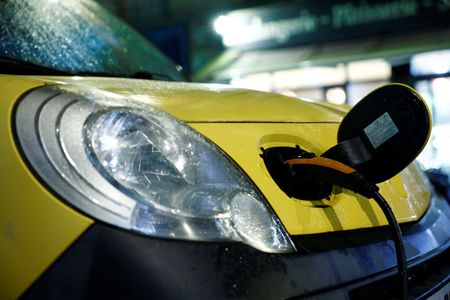By Amir Orusov
(Reuters) -Battery electric cars sold in Europe produce 73% less life-cycle greenhouse gas emissions than their gasoline counterparts, according to research firm, the International Council on Clean Transportation (ICCT).
Meanwhile, other powertrains, including hybrids and plug-in hybrids, show only marginal or no progress in reducing their climate impacts, the ICCT said.
WHY IT’S IMPORTANT
European automakers will have longer to comply with EU C02 emissions targets for cars and vans and could reduce potential fines after the European Parliament gave its backing to a softening of the rules.
Only battery electric cars can deliver the large-scale emission cuts needed to address Europe’s most polluting transport mode, with passenger cars accounting for nearly three-quarters of the sector’s emissions, the ICCT said.
While hybridization offers some benefits, these reductions are relatively small when compared with the battery electric cars’ emissions savings, which makes it insufficient to meet the long-term climate targets, the research company added.
BY THE NUMBERS
Hybrid and plug-in hybrid cars offer only 20% and 30% lower lifetime emissions than gasoline, respectively, as plug-in hybrids are found to be driven less on electricity than previously assumed, the company said.
Europe’s electricity mix is decarbonizing faster than expected, ICCT said, adding that by 2025, renewable energy sources are projected to account for 56% of electricity generation in Europe, representing an 18-point increase compared with 2020.
KEY QUOTES
“Battery electric cars in Europe are getting cleaner faster than we expected and outperform all other technologies, including hybrids and plug-in hybrids,” said Marta Negri, researcher at the ICCT.
“This progress is largely due to the fast deployment of renewable electricity across the continent and the greater energy efficiency of battery electric cars,” she added.
(Reporting by Amir Orusov; Editing by Matt Scuffham)










